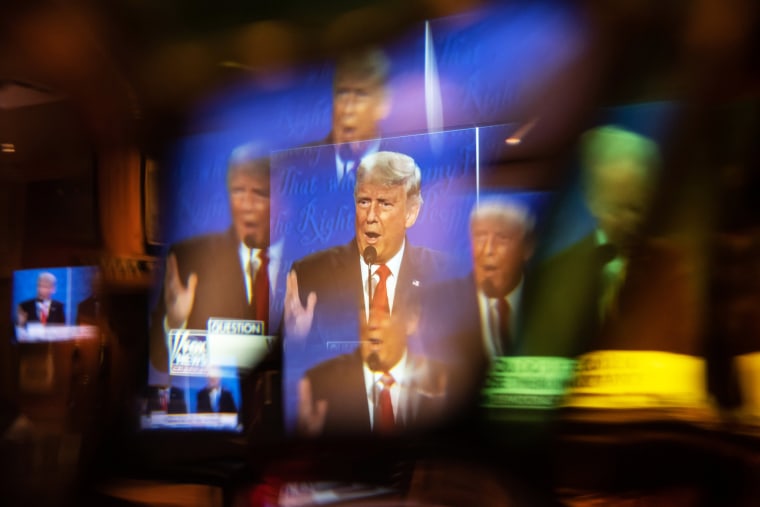WASHINGTON — Democrats have a counterintuitive plan for the final week of the presidential campaign: more Donald Trump, less Joe Biden.
As the president ramps up his barnstorming tour between now and next Tuesday's election, Biden's markedly lighter schedule looks like that of an incumbent congressman who has no opponent. The Democratic nominee took Monday off entirely, while Trump held rallies across Pennsylvania — in Allentown, Lancaster and Martinsburg.
If Trump wins, Biden will surely face recriminations from within his party for sitting on a lead. But Republicans seem more eager than Democrats to get Biden out on the trail, an indication that his four-corners strategy is perceived by both parties as a smart tack.
"He's waved a white flag on life," Trump said Monday in response to Biden charging that the president has surrendered the fight against the coronavirus. "This guy doesn't leave his basement."
Trump wants Biden to appear more often. Meanwhile, many Democrats are thrilled that Trump is holding more of his signature campaign rallies. They routinely highlight his most pugnacious tendencies. They also remind voters who don't attend them that Trump's focus on personal squabbles is virtually unlimited, while his focus on the coronavirus pandemic is sharply limited.
"The more that Trump talks, the more votes he loses," the Democratic strategist Chris Kofinis said. "He is going to be the first president to have talked himself out of office."
This dynamic isn't actually new for Trump. After he won in 2016, campaign aides to then-Democratic nominee Hillary Clinton observed that, for the first time in their memory, polling numbers dropped for whichever candidate was most in the news during a given period of time.
Two years later, in the run-up to the 2018 midterm elections, Trump traveled the country warning supporters that Democrats would win control of the House, he would be impeached and caravans of undocumented immigrants would pour across the United States-Mexico border if they didn't show up to vote for Republican candidates.
Suburban voters flocked to the Democrats, who won the majority in the House and impeached Trump. One Republican senator, Mitt Romney, voted to remove him from office. The caravans magically disappeared from the conversation as soon as the midterm elections were over.
Right now, Biden holds a 7-point lead over Trump in the NBC News average of national polls, and, since February, Rasmussen Reports is the only polling firm that has shown Trump with a lead in a national survey. On Monday afternoon, Biden led by 8 points in the Real Clear Politics polling average in Michigan, 5 points in Pennsylvania and Wisconsin, and less than 2.5 points in Arizona, Florida, Iowa and North Carolina. Trump's leads in the traditional GOP strongholds of Texas and Georgia have fallen to 3 points and half a point, respectively.
And yet many Republicans and Democrats are sensing déjà vu. At this point in 2016, Clinton led Trump in national popular opinion — though by less than half Biden's current margin — and in many of the key battleground states. Undecided voters broke heavily for Trump in the final week of the campaign, and he was narrowly elected president.
Florida Democrats told Biden campaign officials Monday that they are worried about a surge of Hispanic Republican voters in South Florida and a lack of enthusiasm among Hispanic Democrats in central Florida, according to a person familiar with the discussion.
But the Biden campaign may be focused on other states that are both more crucial to accumulating the 270 electoral votes required to win the presidency and more likely than Florida to fall their way. If Biden were to win Michigan, Wisconsin and Pennsylvania — all states where he currently leads — Trump would have to flip turf Clinton won in 2016 to win re-election.
For now, the Democrats' strategy is to keep the spotlight on Trump by controlling Biden's public appearances. That's infuriating Republicans the way that legendary University of North Carolina basketball coach Dean Smith's keep-away four-corners offense agitated rival hoopsters.
"Biden may try and hide from the American people, but he cannot hide his radical agenda," Republican National Committee spokesman Steve Guest wrote in an email to reporters.
Trump and fellow Republicans began accusing Biden of hiding in his basement when the coronavirus crisis surged in March. The line of attack hasn't brought Trump any closer to Biden in the polls. But it has underscored a contrast Biden is trying to draw with Trump: he doesn't feel the need to be the center of every American's attention at every moment of every day.
Biden is relying on Americans being sick of Trump, a state of affairs that would make a butcher's block of red-meat rallies counterproductive for the president. At the same time, Trump wants voters to believe Biden's capacity is diminished, which is harder to demonstrate if the former vice president isn't visibly exhausting himself with a rigorous campaign schedule.
In a week, Americans will know which candidate had the better approach. But for now, Biden is comfortable with Trump's strategy, and Trump is openly chafing at Biden's.

